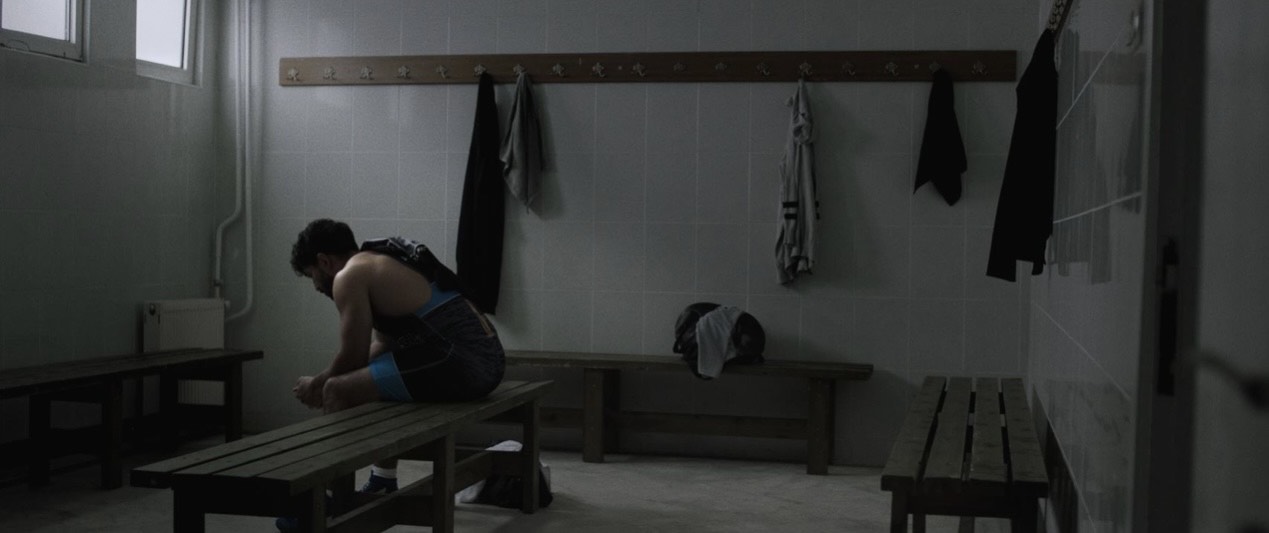The film establishes a somber mood and opens with our lead character, Arash (Sia Alipour), in a shadowy lit alleyway bringing bags of concrete to his job site, setting the visual stage for this short film. A simple gesture signifies that he is an honest and trustworthy hard worker. Arash is also a professional wrestler and aspiring Olympian. In the gym, the picture on the wall, is Arash’s father. Hanging next to the aged black and white picture, is a color poster of the Ayatollah Ali Khamenei, the supreme leader of Iran.

The action heats up as we see Arash on the wrestling mat for the first time. Will he follow in his father’s legacy? Other wrestlers in the locker room are watching online videos of civil unrest and protests back home in Iran. Arash is conflicted about whether to continue to focus on his Olympic aspirations or to try to connect with family members back home. He is soon confronted by his coach (Mehdi Bajestani) and gets a clear warning to keep his focus on his sports career, and not to get involved. Arash acknowledges he stands with his people just like his father did. He must decide whether to take or ignore the advice as civil unrest escalates and the impact becomes personal, pushing him and his family to the brink.
Jelan Maxwell masterfully handles the cinematography for Zargara, delivering a compelling visual story that balances the wrestling scenes with the family drama beautifully. Maxwell creates a chilling depth of field in his scenery, especially with the backlit family scene where the soft white light shines through the curtain like a spirit watching over them. As evident in the protest scenes, the skillful editing creates visceral tension, as emotions run wild. Shot in Istanbul, Turkey, which doubles for Iran and the Middle East, the scenic canvas is full of muted colors and grey overtones which helps create the mood of the Iranian homeland. Maxwell mixes some hand-held cinematography during the wrestling sequences to keep the audience leaned in and feeling as if they are in the ring with them.

The performances of Arash’s mother (Shoale Shahbazi) and his brother Amin (Moeid Zalaghi) are compelling. Shahbazi’s subtle portrayal of grief and resilience, and Zalaghi’s raw, impassioned moments of conflict, drive the emotional arc of the story forward with depth and authenticity. The family scenes in the apartment are expressive and draws you into the deep-seated tension of the situation. Composer KB’s use of Middle Eastern instrumentation effectively establishes an authentic atmosphere, evoking and enhancing the emotional depth and ambience of the drama. The high point of the musical inflection is the protest scene, leaving the audience on the edge of their seat with anticipation of the tense outcome. Alipour delivers a compelling performance. He embraces and handles the physicality of his role with grace, as evident in his wrestling moves throughout the film.

With his artful direction, Zargara establishes everything we need to know about Arash in a very succinct way grounding the audience in his key attributes – honest, trustworthy, skilled athlete, who is loyal to his family and his people. The audience is led to empathize with him as the conflict and moral dilemma he faces is unveiled. Would a gold medal bring this Olympian fame and success and create a desired heightened awareness of peril for the people in Iran? He must grapple with this decision, as he prepares for the next competition.
A Good Day Will Come is a powerful entry for this Oscar-qualifying short film. Audiences are left with asking the real question: ‘But when?’


